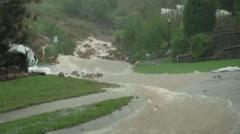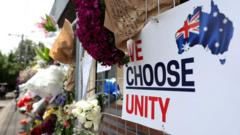The rise of cabanas on Australian beaches has ignited a fierce debate over space and etiquette, pitting sun-seekers against those who feel crowded out. Prime Minister Anthony Albanese has weighed in, stirring discussions on the cultural significance of public beaches.
The Great Australian Cabana Controversy: A Beachfront Battle

The Great Australian Cabana Controversy: A Beachfront Battle
Cabanas have caused a stir on Australian beaches, leading to a cultural clash over public space and sun protection.
The beaches down under are witnessing a dramatic showdown as the emergence of cabanas transforms the sandy shores into a contentious battleground. These large beach tents, known as cabanas in Australia, have surged in popularity over recent years, creating a frustrating dynamic for beachgoers seeking unoccupied space.
“This summer, it feels far more congested than ever. It's like a maze out there,” lamented Claire, a 30-year-old Sydney resident. Cabana enthusiasts have been setting up their polyester shade structures early in the morning, often only to leave them unattended for hours while they enjoy other activities. This practice has led to frustration from those merely looking for a patch of sand to relax on.
The rising discontent surrounding cabanas has sparked a nationwide conversation on cultural values, beach decorum, and the accessibility of public spaces. Critics, including anti-cabana figure Nic Salerno, argue that these extravagant setups monopolize shared spaces and obstruct views, turning the beach into a private domain for the privileged. “Where will everyone else go?” he asked on a recent TV appearance, voicing sentiments echoed by many frustrated beachgoers.
Conversely, supporters of cabanas highlight their importance in promoting sun safety, particularly in a country where skin cancer rates are alarmingly high. Advocates argue that securing a cabana is a matter of practicality—protecting against the harsh Australian sun is vital for many. As echoed by a TikTok user, “We prioritize our health over inconvenience,” defending the trend's merits.
Yet, with the issue heating up, even Prime Minister Anthony Albanese has taken a stand. He stressed the importance of equal access to beaches, a fundamental right for all Australians, critiquing the encroachment of privileged cabana setups. Lifeguards, too, have expressed concern that this trend complicates their duties, emphasizing safety amidst the chaos.
Cultural context plays a pivotal role in this debate. Australia prides itself on egalitarian values, viewing its beaches as democratic spaces where social divisions disappear. According to academic experts, the beach is not just a recreational area but a shared communal asset fundamental to the Australian identity.
The emerging clash of beachgoers instigates calls for local councils to establish guidelines around cabana setups. Suggestions include regulating the number and placement of cabanas to promote fairness and accessibility. While some like beach equipment retailers believe in a structured approach, others caution against extending regulations too far, which might inadvertently shut out certain beach lovers.
Claire, despite her frustrations, advocates for a considerate solution. “It’s just the beach—let’s all find a way to share it harmoniously,” she argues, suggesting that a balance must be struck to maintain the beach as a welcoming space for everyone. As debates rage on, Australians are left contemplating the true essence of their beloved coastal retreats.




















